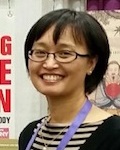2006, 2020
Xiaofei Kang
- Associate Professor
- The George Washington University

Abstract
This study combines history and ethnography to examine Huanglong (“Yellow Dragon”), a multi-ethnic pilgrimage center and UNESCO World Nature Heritage reserve in western China. In the post-socialist era a tourist economy is transforming ethnic traditions and the religious landscape as the state and local groups, including Han Chinese, Tibetan, Qiang, and Muslim, contest historical ownership of the site. Textual research reveals unexpected breaks and continuities in local ethno-religious history. Fieldwork exposes conflicts among UNESCO's environmental policies, China's development plans and indigenous beliefs in sacred place. The study aims to contribute to better comparative understanding of the role of religion in constructing ethnic identity and modernity in an age of global tourism.
Abstract
This book project challenges the prevailing assumption that the Chinese Communist revolution offered no room for religion. It examines the intertwined discourses of religion and revolution in Communist propaganda in the Party’s quick rise to dominance from the 1940s to the early 1950s. Crossing the political divide of 1949, this project argues that the Party utilized religion to mobilize widespread support and to construct a new form of legitimacy for its rule. It further demonstrates that gendered language and symbolism defined how propaganda workers manipulated and reconfigured traditional religious resources for the revolution. The book promotes new understanding of the revolution's tenacious connections with the old cultural system and its bearings on contemporary politics.

